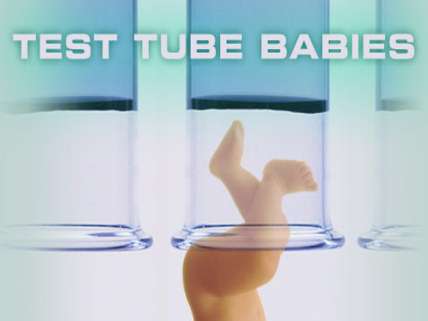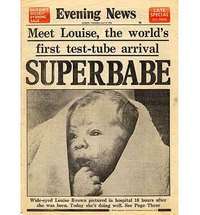Nobel Laureates Call For Halting Scientific and Ethical Progress
Permissionless innovation works best for both scientific and moral progress.

Two brilliant biologists, Paul Berg and David Baltimore, are calling for a moratorium on using the fantastic new and very precise CRISPR gene-editing technology to change the human germ-line. Basically, they don't want researchers to use the technology now to change the genes of human sperm, eggs, or embryos. They do agree that it would arguably be ethical to use the technology to fix genes in embryos that cause inheritable maladies such as Huntington's Disease. However, they counter that other methods can now generally be used to achieve that end, e.g., in vitro pre-implantation genetic diagnosis and selection of embryos.
What they want especially to forestall (at least for now) are attempts to use the CRISPR to give embryos and thus ultimately children new genetic characteristics that they would otherwise not inherit. From their op-ed in yesterday's Wall Street Journal:
The other, more unsettling kind of germ-line modification would involve attempts to modify inheritance for the purpose of enhancing an offspring's physical characteristics or intellectual capability. We can call this voluntary modification in that there is no compelling medical need. Choosing to transmit voluntary changes to future generations involves a value judgment on the part of parents, a judgment that future generations might view differently.
This can be seen as eugenics, thought by earlier generations to be desirable but now generally considered abhorrent. Also, we often do not know well enough the total range of consequences of a given gene alteration, potentially creating unexpected physiological alterations that would extend down through generations to come. For these reasons and others, voluntary genome alteration might well be outlawed, at least at the present stage of knowledge.
One huge problem with this op-ed is that Baltimore and Berg are not making the ethically crucial distinction between state-imposed eugenics, in which governments try to eliminate "undesirable" characteristics by involuntarily sterilizing people, versus parents who would be practicing eugenics by voluntarily trying to endow their progeny with desirable characteristics.

In addition, the two are worried that genetic alternations will "extend down through generations to come"—as though future generations will not be able to use even better and safer technologies to alter the genetic choices made by earlier generations.
Berg and Baltimore are calling for an international meeting to discuss what limits should be put on this new technology, explicitly citing the example of the Asilomar Conference in the 1970s that ended up imposing generally useless but neverthelss onerous restrictions on early gene-splicing experiments. The two argue:
We need to ensure that we have widespread agreement about what is desirable.
Let parents decide what is desirable, not a committee, not even one composed of well-meaning and brilliant biologists.
Asilomar is the wrong model; the pusuit of in vitro fertilization is the right model. Calls for a ban on in vitro fertilization research were widespread in the 1960s and 1970s, yet Bob Edwards and Patrick Steptoe doggedly worked on. Opposition to in vitro fertilization quickly melted away with the birth of Joy Louise Brown in 1978. At least 4 million babies have since been born via artificial reproduction and Bob Edwards finally got his well-deserved Nobel Prize in 2010.
Permissionless innovation works best for promoting both scientific and moral progress.


Show Comments (54)